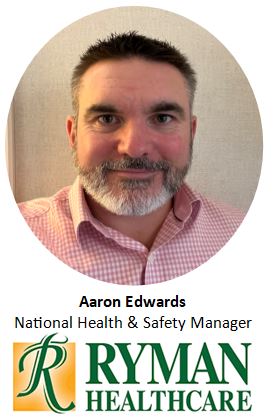Aaron Edwards

Aaron Edwards
National H&S Manager, ryman healthcare
A potentially catastrophic near miss started Aaron Edwards on his health and safety journey. He is now the National Health and Safety Manager at Ryman Healthcare, and responsible for 8 sites in New Zealand with around 2500 workers.
Q1: What is your background, and how did you get started in Health and Safety?
I worked in construction and demolition for many years in the UK. In 2009 I was operating a 42 Tonne excavator while demolishing an old college building. My machine was sitting on a temporary pad 4 metres off the ground while removing a large steel structure. My supervisor asked me to put my bucket behind one of the steel girders being removed as fall protection while he removed it with his excavator. I had seen one of these beams snap in a similar situation, and I knew that this was inherently unsafe. However, as he was the supervisor, I trusted his judgement. Sure-enough when the beam was supported by my bucket I heard a loud crack, and several tonnes of steel came straight at my machine. I instinctively slewed the cab to try and get out of the path of the beam. It crashed into the diggers track with enough force to dislodged a track roller, missing me by about 400mm. The others on site rushed over believing I was dead. After this incident I vowed never to do something that I knew could be unsafe, and that no one else would have to do so either.
I started to put my hand up for health and safety roles, starting as a rep and then gaining more responsibility.
2: How has your health and safety journey progressed?
I moved into a supervisor role with health and safety responsibilities, and then from there became operations and H&S manager in construction and demolition company. I came out to New Zealand in 2013 and worked on the post-quake demolition and rebuild. The key to my progression was my experience on the ground combined with formal training and qualifications. At the end of the day people are the problem and people are the solution, and health and safety is all about understanding people and what are their motivations and values. I started work at Ryman four years ago as a Health and Safety Advisor and saw this as an ideal opportunity to utilise my experience and skills.
Q3: Were there any specific people who helped you on your journey?
The initial push was from my original supervisor in the UK, who laughed off the near-death incident and said it won’t be the last close call you have. Ryman has supported me hugely, from the Board to the CEO and senior management team. They show great leadership in health and safety, and set the culture for the whole organisation.
Q4: How has health and safety changed over the last few years?
Health and safety is becoming more about people than policies. In 2009, it was all about rules and regulations, with health and safety practitioners behaving like policemen. A previous manager in the UK told me that health and safety was a 30-minute tick box exercise and off you go. Now the role is all about engaging and influencing people, understanding their motivations, and educating them to understand the why.
Q5: What are the biggest challenges you face now?
The challenge from Covid has been huge. On one site we had 22 out of 120 test positive in one day. This makes it very hard to manage the critical risks on site and ensure that we have the competency in place to ensure things happen safely. Building a team through the pandemic has also been a challenge, with lots of zoom meetings and interviews. Contractor management is another challenging area but this has improved vastly since I first came to New Zealand in 2013 when the “she’ll be right” attitude prevailed, but there is still work to do.
Q6: How has the health and safety culture developed over your time in New Zealand?
The biggest change has been the improvement around awareness and shifting the focus from not doing bad things to promoting what good looks like. Positively recognising good behaviour and practice creates a great culture and removes other language and background issues.
Q7: Where do you see the industry heading in the next few years?
I see mental health and wellbeing becoming more of a focus as we come out of Covid. A lot of people have faced a lot of challenges over the last couple of years, and the results will surface in the workplace. I am also interested where technology will take health and safety in the future. The next generation has more ability and awareness in this area, and this presents a great opportunity.
Q 8: Any advice for someone wanting to start a career in health and safety?
Do it for the right reasons. Health and safety is all about people. If you move into health and safety for power or the rules and regulations, you should probably do something else. You cannot influence people you can’t engage with. You need to have resilience, integrity, communication skills, the right attitude, and mostly, empathy.